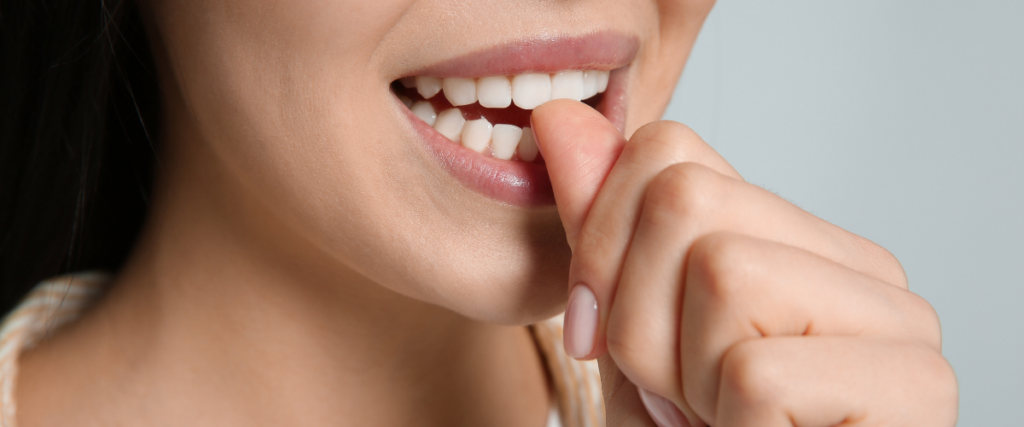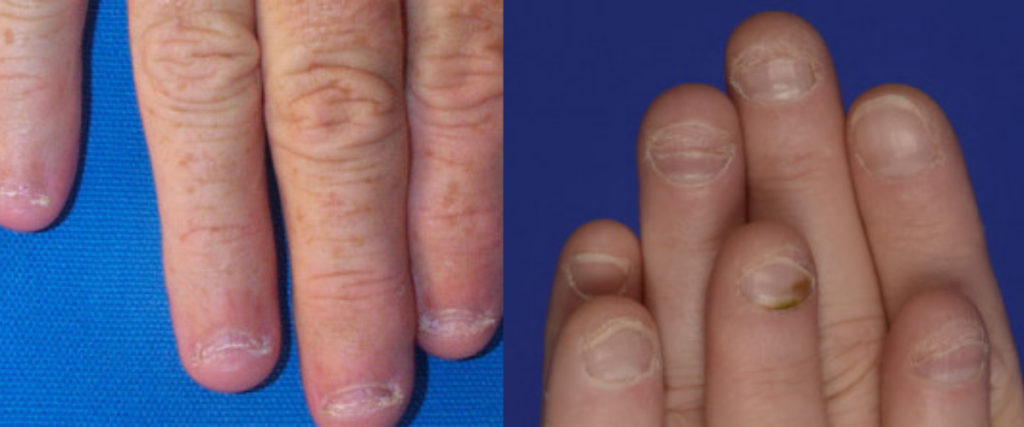Article reviewed by:
Dr Steven Soo • Prosthodontist

While nail-biting is prevalent, its effects extend beyond damaging nails and fingers. Many people are unaware of its negative impact on teeth and the mouth. Therefore, understanding the potential issues is crucial, especially if you’re attempting to stop the habit.
Why does nail-biting happen?

Nail-biting, clinically referred to as onychophagia, is classified as an impulse control disorder. It is a type of body-focused repetitive behaviour in which individuals start biting their fingernails and the skin around the nails and cuticles for various reasons. Typically, this habit starts in childhood and can become more frequent during adolescence.
Stress and anxiety
It can be a nervous habit to seek temporary relief from stress and anxiety.
Absentminded tendency
For some individuals, nail biting is a self-soothing mechanism to stay alert and awake. Research also suggests that nail-biting can stem from boredom, where people do it to keep themselves occupied.
Emotional or psychological problems
In some cases, it can also be associated with certain mental conditions, such as:
- Attention Deficit Hyperactivity Disorder (ADHD)
- Major Depressive Disorder (MDD)
- Obsessive-Compulsive Disorder (OCD)
- Oppositional defiant disorder
- Separation anxiety disorder
- Tourette syndrome
Impacts of nail-biting
Your dentist may have cautioned against chewing hard nuts and ice cubes to prevent tooth chipping. The same advice applies to nail biters. These are the possible dental impacts of biting your nails:
- Chipped or cracked teeth: The friction caused by teeth grinding against the nails can slowly erode the enamel or lead to cracking or chipping of the teeth.
- Gingivitis: This habit can transfer dirt and germs from the fingers to the mouth, potentially leading to gum disease.
- Bruxism: It can heighten the risk of developing a chronic teeth-grinding habit, which can cause additional oral health issues, headaches, and jaw soreness.
- Malocclusion: It doesn’t only harm the teeth; it can also cause them to shift, resulting in malocclusions (bite problems) and gaps.
- Dislodged crowns or veneers: It can also cause your crowns or veneers to be dislodged or chipped.
- Temporomandibular Joint Disorder (TMD): Nail-biting is classified as a parafunctional habit, also known as muscle hyperactivity, which includes grinding of the teeth. Teeth grinding is one of the causes of TMD.
- Food poisoning: As dirt is easily trapped under nails, this habit can sometimes lead to food poisoning.
Tips to stop nail-biting
Here are several strategies to overcome nail-biting:
- Trim your nails: Short nails make it harder to bite. Keeping nails short reduces the temptation to nibble and serves as a reminder to stop.
- Find out your triggers: Once you acknowledge the triggers for nail-biting, you can take control of the habit more effectively, ultimately stopping it completely.
- Apply nail polish or get a manicure: If you’ve invested time and money in making your nails beautiful, you might feel inclined to maintain their appearance.
- Speak to a medical doctor (psychologist) if you bite your nails due to anxiety.
Is it necessary to break the habit?
It will require some extra effort, but doing so will help you protect your fingernails and maintain healthy teeth.
Regular dental visits are also essential as your dental specialist will help to check for any damage related to your habit.
If you have this habit, speak to our dental specialists to see what treatment options are available for you.
Need some dental assistance?
Drop us a text via the WhatsApp icon on the bottom right corner, enquire or call us at (65) 6733 7883.







